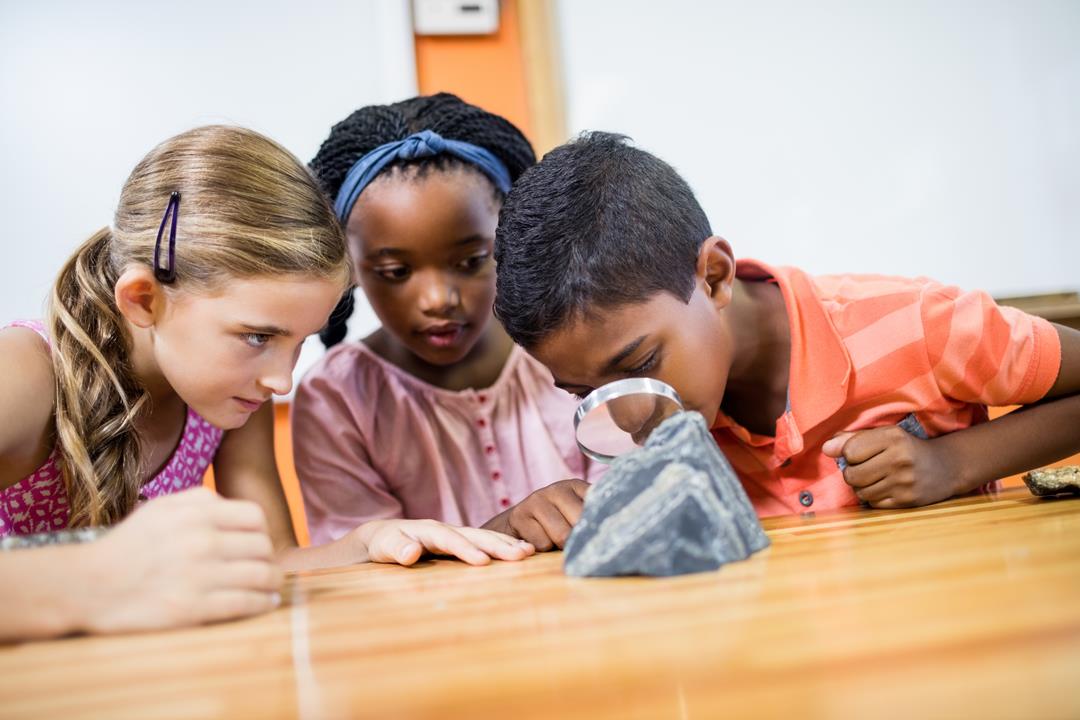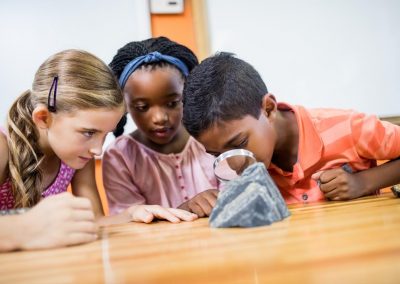Environmental Studies
Environmental Studies include the following subjects:
Science
Children learn about a wide range of living things, materials and phenomena. They begin to make links between ideas and to explain things using simple models and theories. They apply their knowledge and understanding of scientific ideas to familiar phenomena, everyday things and their personal health. They begin to think about the positive and negative effects of scientific and technological developments on the environment and in other contexts. They carry out more systematic investigations working on their own and with others. They use an increasing range of reference sources in their work. In time they talk about their own work and its significance, and communicate ideas using a wide range of scientific language, conventional diagrams, charts and graphs.
For Cambridge Primary Science, the curriculum is presented in four content areas or ‘strands’. These are further subdivided into ‘substrands’. The four strands and substrands are:
Scientific Enquiry
- Ideas and evidence
- Plan investigative work
- Obtain and present evidence
- Consider evidence and approach
Biology
- Plants
- Living things in their environment (from Grade 1)
- Humans and animals
Chemistry
- Material properties
- Material changes (from Grade 1)
- States of matter (from Grade 3)
Physics
- Forces (forces and motion from Grade 2)
- Light and dark (form Grade 1)
- Electricity (from Grade 1, Electricity and magnetism from Grade 3)
- The Earth and beyond (from Grade 1)
- Sound
Scientific enquiry is about considering ideas, evaluating evidence, planning investigative work and recording and analysing data. The Scientific enquiry objectives underpin Biology, Chemistry and Physics, which are focused on developing confidence and interest in scientific knowledge. Environmental awareness and some history of science are also incorporated.
The Cambridge Primary Science curriculum framework provides a solid foundation upon which the later stages of education can be built.
Global Perspectives
The programme develops the skills of research, analysis, evaluation, reflection, collaboration and communication. It strengthens the links across English as a first or second language, mathematics, science and ICT.
Research says that the earlier students start to develop and practise their skills, the greater the impact on their learning. Global Perspectives will develop and embed cross-curricular skills at an earlier age, supporting them in their studies as they progress to Middle School and beyond.
Geography
Our imbedded Geography programme inspires in students a curiosity and fascination about the world and its people that will remain with them for the rest of their lives. Teaching equips students with knowledge about diverse places, people, resources and natural and human environments, together with a deep understanding of the Earth’s key physical and human processes. As students progress, their growing knowledge about the world should help to deepen their understanding of the interaction between physical and human processes, and of the formation and use of landscapes and environments. Geographical knowledge, understanding and skills provide scales are shaped, interconnected and change over time.
Subject content introduced age appropriately over course of Primary Education
Locational knowledge: From naming world’s seven continents and five oceans and features and characteristics of countries and cities to the use of maps, environmental regions, topographical features (hills, mountains, etc), land-use patterns, latitude, longitude, Equator, Hemispheres, Tropics and Poles and time zones.
Place knowledge: Geographical similarities and differences through study of human and physical geography.
Human and physical geography: From identifying seasonal and daily weather patterns, use geographical vocabulary to describing and understanding key aspects of physical geography including climate zones, biomes and vegetation belts. In human geography – types of settlement, land use, economic activity including trade links and the distribution of natural resources such as energy, food, minerals and water.
History
Our imbedded History programme helps students gain a coherent knowledge and understanding of World history, by inspiring a curiosity to know more about the past. Teaching equips pupils to ask perspective questions, think critically, weigh evidence shift arguments, and develop perspective and judgement. History helps students to understand the complexity of people’s lives, the process of change, the diversity of societies and relationships between different groups, as well as their own identity and challenges of their time.
Subject content taught age appropriately
- changes within living memory and where appropriate reveal aspects of change in national and international life
- events beyond living memory, that are significant nationally or globally
- the lives of significant individuals in the past who contributed to national and international achievements
- significant historical events nationally and internationally
- achievements of earliest civilizations
An overview of where and when the first civilizations appeared and a study of Ancient Sumer, the Indus Valley, Ancient Egypt, the Shang Dynasty , African Empires, Greek civilization, Roman Empire, Mayans, Aztecs, Islamic Empires, Vikings, North American Indians etc….
Science
Children learn about a wide range of living things, materials and phenomena. They begin to make links between ideas and to explain things using simple models and theories. They apply their knowledge and understanding of scientific ideas to familiar phenomena, everyday things and their personal health. They begin to think about the positive and negative effects of scientific and technological developments on the environment and in other contexts. They carry out more systematic investigations working on their own and with others. They use an increasing range of reference sources in their work. In time they talk about their own work and its significance, and communicate ideas using a wide range of scientific language, conventional diagrams, charts and graphs.
For Cambridge Primary Science, the curriculum is presented in four content areas or ‘strands’. These are further subdivided into ‘substrands’. The four strands and substrands are:
Scientific Enquiry
- Ideas and evidence
- Plan investigative work
- Obtain and present evidence
- Consider evidence and approach
Biology
- Plants
- Living things in their environment (from Grade 1)
- Humans and animals
Chemistry
- Material properties
- Material changes (from Grade 1)
- States of matter (from Grade 3)
Physics
- Forces (forces and motion from Grade 2)
- Light and dark (form Grade 1)
- Electricity (from Grade 1, Electricity and magnetism from Grade 3)
- The Earth and beyond (from Grade 1)
- Sound
Scientific enquiry is about considering ideas, evaluating evidence, planning investigative work and recording and analysing data. The Scientific enquiry objectives underpin Biology, Chemistry and Physics, which are focused on developing confidence and interest in scientific knowledge. Environmental awareness and some history of science are also incorporated.
The Cambridge Primary Science curriculum framework provides a solid foundation upon which the later stages of education can be built.
Geography
Our imbedded Geography programme inspires in students a curiosity and fascination about the world and its people that will remain with them for the rest of their lives. Teaching equips students with knowledge about diverse places, people, resources and natural and human environments, together with a deep understanding of the Earth’s key physical and human processes. As students progress, their growing knowledge about the world should help to deepen their understanding of the interaction between physical and human processes, and of the formation and use of landscapes and environments. Geographical knowledge, understanding and skills provide scales are shaped, interconnected and change over time.
Subject content introduced age appropriately over course of Primary Education
Locational knowledge: From naming world’s seven continents and five oceans and features and characteristics of countries and cities to the use of maps, environmental regions, topographical features (hills, mountains, etc), land-use patterns, latitude, longitude, Equator, Hemispheres, Tropics and Poles and time zones.
Place knowledge: Geographical similarities and differences through study of human and physical geography.
Human and physical geography: From identifying seasonal and daily weather patterns, use geographical vocabulary to describing and understanding key aspects of physical geography including climate zones, biomes and vegetation belts. In human geography – types of settlement, land use, economic activity including trade links and the distribution of natural resources such as energy, food, minerals and water.
Global Perspectives
The programme develops the skills of research, analysis, evaluation, reflection, collaboration and communication. It strengthens the links across English as a first or second language, mathematics, science and ICT.
Research says that the earlier students start to develop and practise their skills, the greater the impact on their learning. Global Perspectives will develop and embed cross-curricular skills at an earlier age, supporting them in their studies as they progress to Middle School and beyond.
History
Our imbedded History programme helps students gain a coherent knowledge and understanding of World history, by inspiring a curiosity to know more about the past. Teaching equips pupils to ask perspective questions, think critically, weigh evidence shift arguments, and develop perspective and judgement. History helps students to understand the complexity of people’s lives, the process of change, the diversity of societies and relationships between different groups, as well as their own identity and challenges of their time.
Subject content taught age appropriately
- changes within living memory and where appropriate reveal aspects of change in national and international life
- events beyond living memory, that are significant nationally or globally
- the lives of significant individuals in the past who contributed to national and international achievements
- significant historical events nationally and internationally
- achievements of earliest civilizations
An overview of where and when the first civilizations appeared and a study of Ancient Sumer, the Indus Valley, Ancient Egypt, the Shang Dynasty , African Empires, Greek civilization, Roman Empire, Mayans, Aztecs, Islamic Empires, Vikings, North American Indians etc….






















